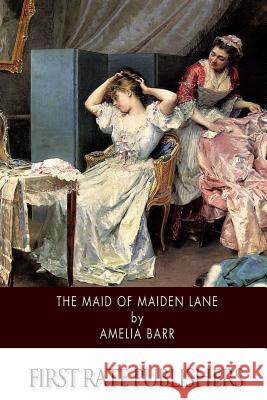The Maid of Maiden Lane » książka
The Maid of Maiden Lane
ISBN-13: 9781508798842 / Angielski / Miękka / 2015 / 122 str.
This is a historical fiction set in 18th century New York. From the intro: "Never, in all its history, was the proud and opulent city of New York more glad and gay than in the bright spring days of Seventeen-Hundred-and-Ninety-One. It had put out of sight every trace of British rule and occupancy, all its homes had been restored and re-furnished, and its sacred places re-consecrated and adorned. Like a young giant ready to run a race, it stood on tiptoe, eager for adventure and discovery-sending ships to the ends of the world, and round the world, on messages of commerce and friendship, and encouraging with applause and rewards that wonderful spirit of scientific invention, which was the Epic of the youthful nation. The skies of Italy were not bluer than the skies above it; the sunshine of Arcadia not brighter or more genial. It was a city of beautiful, and even splendid, homes; and all the length and breadth of its streets were shaded by trees, in whose green shadows dwelt and walked some of the greatest men of the century. These gracious days of Seventeen-Hundred-and-Ninety-One were also the early days of the French Revolution, and fugitives from the French court-princes and nobles, statesmen and generals, sufficient for a new Iliad, loitered about the pleasant places of Broadway and Wall Street, Broad Street, and Maiden Lane. They were received with courtesy, and even with hospitality, although America at that date almost universally sympathized with the French Republicans, whom they believed to be the pioneers of political freedom on the aged side of the Atlantic. The merchants on Exchange, the Legislators in their Council Chambers, the working men on the wharves and streets, the loveliest women in their homes, and walks, and drives, alike wore the red cockade. The Marseillaise was sung with The Star Spangled Banner; and the notorious Carmagnole could be heard every hour of the day-on stated days, officially, at the Belvedere Club. Love for France, hatred for England, was the spirit of the age; it effected the trend of commerce, it dominated politics, it was the keynote of conversation wherever men and women congregated."
Zawartość książki może nie spełniać oczekiwań – reklamacje nie obejmują treści, która mogła nie być redakcyjnie ani merytorycznie opracowana.











